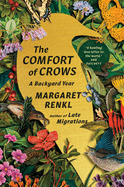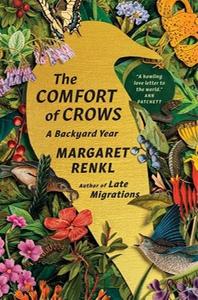
 In her luminous third book, The Comfort of Crows, Margaret Renkl (Graceland, at Last; Late Migrations) takes readers through the details of a year in her Nashville neighborhood. Elegant, lucid essays follow the changing seasons, Renkl musing on the migratory and nesting patterns of birds, the encroaching effects of climate change, her own evolving family structure, and the incremental shifts of flora, fauna, and light. "Here is the world I need," Renkl writes, "a world that exists far beyond the impulse to scroll and scroll." The Comfort of Crows, lavishly illustrated with mixed-media collages by her brother, Billy Renkl, invites readers to explore the details of nesting bluebirds, maple trees, garden grubs, sunsets, and Renkl's affection for the birds of the book's title. Though she acknowledges crows' association with death, she also insists that they are "smart and brave and loyal." As she enters a new year, Renkl "cling[s] to the crow's promise of metamorphosis."
In her luminous third book, The Comfort of Crows, Margaret Renkl (Graceland, at Last; Late Migrations) takes readers through the details of a year in her Nashville neighborhood. Elegant, lucid essays follow the changing seasons, Renkl musing on the migratory and nesting patterns of birds, the encroaching effects of climate change, her own evolving family structure, and the incremental shifts of flora, fauna, and light. "Here is the world I need," Renkl writes, "a world that exists far beyond the impulse to scroll and scroll." The Comfort of Crows, lavishly illustrated with mixed-media collages by her brother, Billy Renkl, invites readers to explore the details of nesting bluebirds, maple trees, garden grubs, sunsets, and Renkl's affection for the birds of the book's title. Though she acknowledges crows' association with death, she also insists that they are "smart and brave and loyal." As she enters a new year, Renkl "cling[s] to the crow's promise of metamorphosis."
Beginning in winter, when many plants are dormant, Renkl nonetheless proves that her nearby landscape is very much alive. Ailing foxes, hungry birds, sunbathing turtles, and her own dog's "Marvelous Nose" remind Renkl and her readers to pay attention to winter's denizens. As the calendar turns toward spring, Renkl records various birdsongs, the shifting light and weather, and her own impatience with waiting for warmer days. She sprinkles brief "Praise Songs" in between her longer essays, highlighting small glimpses of everyday nature: "Praise Song for the Maple Tree's First Green"; "Mole Hands in Coyote Scat"; "Sleeping Bees," "Dead Leaves"; and even "a Spring I Was Not Alive to See." She weaves in family anecdotes and imagined stories; moments from when her sons were young and when they moved back home during the Covid-19 pandemic; and trips with her husband to a friend's nearby cabin on the Cumberland Plateau, where trout lilies bloom in the woods. Nature, she reminds us, is in unspoiled wild places, but it is also in cities and suburbs, even as humans continue to encroach on forests and fields.
"The natural world's perfect indifference has always been the best cure for my own anxieties," Renkl writes, noting that nature adapts and endures, no matter how humans behave (or don't). The Comfort of Crows celebrates the beauty and durability of nature's age-old cycles and the habits of wild creatures, and it urges human beings to care for these same creatures--before some of them disappear altogether. --Katie Noah Gibson, blogger at Cakes, Tea and Dreams
Shelf Talker: Margaret Renkl's elegant, lucid third book of essays takes readers through the cycle of a year in the wild places surrounding her Nashville home.

